LGBT Voices: Report of a panel discussion held during Chennai Pride 2011
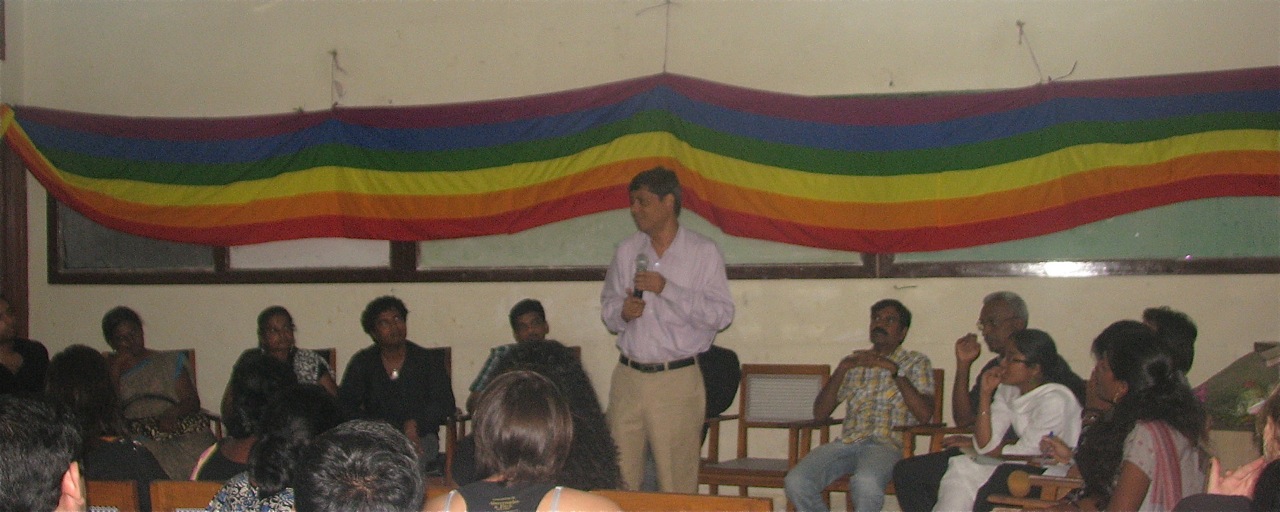
By Deepan Kannan, with input from Su Deepthi
–For long now, the lives of sexual minorities have been shadowed by sheer ignorance and bigoted attitudes of the society. As a result, LGBT issues have largely gone unaddressed and unnoticed so far. And the lack of forums and spaces to voice out their issues has only compounded the problem. But now, the scene is all set to change positively with the increase in number of voices and representations from the LGBT community. There are also forums being created in the city to address the issues of LGBT struggle.
One such forum was the panel meet organized by Chennai Rainbow Pride in the city, as part of its month long series of events in June that celebrate the diversities of sexuality and gender. LGBT Voices: A Panel Discussion saw members of LGBT community and a committee of experts from healthcare, law and law enforcement, engage in a free-wheeling discussion that examined community concerns and issues faced by lesbians, gay men, bisexuals, transgenders, kothis and aravanis. The event was held at the Inter-Church Service Organization (ICSA) Centre, Egmore, one of those rare spaces in Chennai that is completely open to LGBT events.
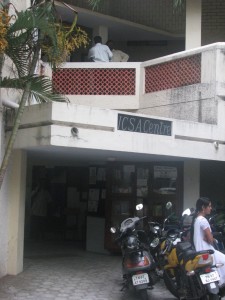 |
Panelists from the LGBT community, through their stories, raised some crucial questions to the expert committee. The expert committee in turn put forth its opinions and offered valuable guidance to the gathering.
The LGBT community panel included Sid, Sankari, Kaavya, Jaya, Ajay Gabriel, Vikranth, Srijith Sundaram, Chitra and Angel Glady.
The expert committee had Dr. Suresh Kumar (psychiatrist), Dr. Poorna (anesthesiologist), Mr. Shiva Kumar (community organizer with Sangama), Mr. Sathyanarayanan (retired police official), Poongkuzhali Balasubramaniam (Advocate), Mr. Rohan (representing the corporate sector), Dr. Venkatesan Chakrapani (STI specialist and LGBT health expert) and Magdalene Jayarathnam (counselor with expertise in LGBT issues), responding to the questions that were raised by the LGBT panel.
Sid, Ajay Gabriel and Vikranth raised important issues of workplace discrimination that a gay or lesbian person faces. Sid shared his thoughts on why it is difficult for a gay man to be open about his sexual orientation in a workplace that does not have any policies against discrimination and harassment towards sexual minorities. He also reflected on the immense pressure that a man faces at the workplace to conform to gender stereotypes, ranging from conservative dressing to conversation, including discussing women and projecting the image of a highly ambitious and a macho male. He wondered if it would possible to create a more accepting and an inclusive atmosphere at the workplace, where a man was less bound by gendered stereotypes, and did not have to speak about girlfriends. Is it possible for an openly gay man to grow in his career without fearing discrimination?
Vikranth, Director of Chennai Dost, highlighted the importance of sensitization of Human Resource departments of businesses to the challenges faced by people with non-normative sexual orientations. He also spoke of the difficulties of living as an openly gay man in the city, even if one is financially stable, primarily due to the lack of support from biological family.
Ajay Gabriel expressed the need for structures and mechanisms to address the issues of harassment and bullying at workplaces. Often, people with sexual orientations outside of the norm are branded as eccentric. This alienates them from society, as it creates a challenge of inability to socialize with people. He concluded by emphasizing on the necessity for bringing in structured policies and adequate support systems to address and acknowledge the problems faced by sexual minorities.–
Angel Glady, a transgender woman working in a private software firm in the city, shared her success story that was inspiring to many in the gathering. She narrated the agony that she had gone through in her initial years as an employee living as a man. Despite having disclosed to the Team Leader about her gender identity, she was forced to come to work in male attire. In addition, she also had to undergo physical discomfort such as using the male restroom. She then made a decision to quit after her failed attempts to make the Team Leader understand her situation. But Glady’s hard work and commitment paid off, when she was offered the same position in the same company again, post her transformation to a woman. The second time she made it clear that she would identify herself only as a woman. And to her surprise, the company acceded without any qualms. However, when she got back to work as a woman, she had to endure uncomfortable and piercing stares from her colleagues. Except for few close friends, the others stayed away from her. It took time for people to realize and accept her. Even now, when a new employee joins, she faces similar discomfort.Through her story she stressed that every company should provide orientation to its new hires highlighting the importance of an inclusive environment for transgender people and those of alternate sexuality.
Chitra, a city professional, talked about the vexing absence of forums and support groups for lesbian women in Chennai. The focus on alternative sexuality tended to center on gay men and transgender people, and many times, issues regarding lesbian women do not get the necessary attention. Being a lesbian in a traditional city like Chennai, it was quite a long process for Chitra to gain self-awareness: it was only at the age of 25 that she managed come to terms with her sexual orientation. She attributed it to the lack of awareness about lesbian women that looms large in the mainstream society in Chennai. In her discussion, she also brought to notice the smothered lives of many lesbian women who resort to suicide as their last effort to escape the oppression. In a city like Chennai, where patriarchy and misogyny are at play in a pronounced level, being a lesbian is, for sure, a case of double marginalisation. But the Pride March that was held in the city last year had given her the hope and confidence. It had not only made her bolder but had also created a platform to meet many others like her. She concluded by saying that she finds Chennai to be a wonderful place to live, if only it is more accepting and inclusive.
Srijith, a theatre artist and a long time supporter of LGBT rights, spoke of the denigrating way in which print and visual media cover the issues of marginalised people.
Jaya, a self-identified kothi and employee of Sahodaran, brought to fore the identity crisis that an effeminate MSM faces in the world that lives by staunch notions of masculinity and femininity. Having overcome many struggles and ill treatments in her life, Jaya has a lot of questions that s/he asks hirself. S/he is constantly plagued by the question of who people like hir really are. Why are they effeminate? Like a cat on the wall, s/he feels neither there nor here. Weighed down by indecisiveness and confusion, s/he and others like hir long are plagued by low self esteem. Even if s/he is beaten and ridiculed, s/he only accepts it as hir fate. This results in disregard and neglect of one’s body, wellness and health-seeking behavior. As a non-conformist to the society’s gender stereotypes, s/he undergoes a constant struggle of identity crisis. In the general society, s/he struggles to find his own space and peace.
–
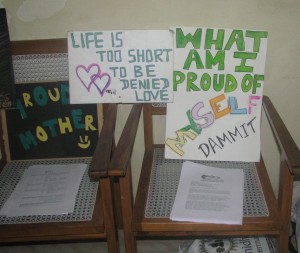 |
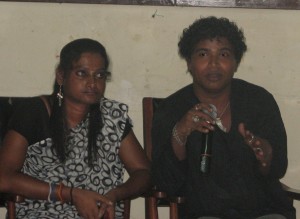 |
Sankari, a staff member of Sangama Chennai, touched upon an issue that is seldom talked about. There is significant support and guidance available for male to female transsexuals. However, when it comes to the issues of female to male transsexuals, there is complete lack of guidance or support. She brought to the notice of committee that there is no information available regarding the surgical support for female to male transformation. She also highlighted the uncertainty regarding the safety and quality of the surgical procedures that are performed for the transformation from male to female.
Kaavya, a member of Sahodaran’s team, shared stories that are everyday realities for many transgender people. Acceptance of children for who they are is something that is rare among families. Parents often consider children’s alternative gender/sexual orientation as an insult to their family pride or dignity. This has led to the abandonment of many transgender people by their own families. However, she observed that the same families have no hesitation in in receiving the financial support from the children that they have mercilessly abandoned. She concluded by saying that they will be able to lead successful lives, if the families showed some acceptance and acknowledgement.
After the LGBT community shared their experiences and stories, the expert committee set out to respond to many of the question that were raised.
Following the presentations by community members, the Chennai Rainbow Pride coalition’s media release for Pride 2011 was read out in English and Tamil. The media release encapsulated many of the demands of the community with respect to non-discrimination from healthcare, law, law-enforcement, media, business, family and society.
In the next segment, Dr. Poorna talked about the general attitudes of doctors towards gay men. Many physicians consider homosexuality to be a disease and suggest ‘treatments’ for ‘cure’ to the misinformed parents of gay youth. He wondered if doctors in the country still practice electro-shock therapy [Ed: they do] as a measure to ‘cure’ homosexuality. He also sought legal guidance on the consequences that a doctor would face if he/she performs sex reassignment surgery.
Dr. Suresh Kumar, a well-known Chennai-based psychiatrist, began his speech by reflecting on the journey he had as a psychiatrist in the past three decades. He acknowledged that even in the medical community, there is poor understanding about sexuality and related issues. Many times, the doctors’ perspectives on sexuality do not differ much from those of the general public. He brought to the notice of the group that the five year medical training for doctors does not include sexualities as a part of the curriculum. Even the little references to sexualities in the course are often avoided by the professors in the class room. As a result, a doctor graduates from medical school with absolutely no knowledge and awareness about sexualities. And he averred that it is the same with those who have chosen to specialize in psychiatry following. Till 1970, homosexuality was considered to be a mental disorder. But, later by the large consensus of the medical experts, it was proved not to be a disorder.
He commented on the general reaction of parents to their children’s sexual orientation. He narrated that his three decades of practice as a psychiatrist, he had come across several mothers and fathers, who plead, force and set deadlines to change the mindset of their sons and daughters. In general, his first step towards approaching the issue is to make the families understand that homosexuality is not a mental disorder. He made a vivid description of sexualities by comparing it with a rainbow. Like a rainbow, sexuality is a wide spectrum with no stark boundaries of orientation and preference.
–
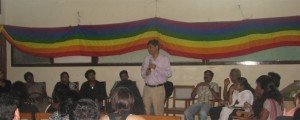 |
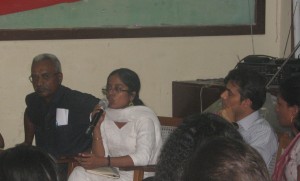 |
He then responded to the comments put forward by Kaavya and Sankari about the lack of family acceptance. He reiterated that family acceptance comes a long way in helping sexual minorities to lead better lives. He also brought to the table an important understanding about the society’s attitude. The obnoxious attitude is only the reflection of the mindset of individual families, which are in turn smaller units of the society. And an individual family is under immense pressure from the society to conform to the generalized ideas of sexuality.
Touching upon the issue brought forward by Jaya, Dr. Suresh Kumar made the point that lack of respect for oneself leads to low self esteem. He also made a clarification that low self esteem is not clinical depression, which is a biological disorder, but only a form of demoralization. He also affirmed that one does not have to be administered anti depressants for the demoralization that he or she undergoes. It is only a manifestation of the abuse and discrimination that one had faced from family, friends and society in his or her life; and has to be tackled as such.
He strongly suggested that people of alternative sexual orientation and gender identities connect with others from the same community. Seeking out support from people with similar experiences will boost the confidence and offer a sense of acceptance, he said. He advised against self victimization, which is very common among sexual minorities. He also made an important point that psychiatrists should recognise self esteem as the first critical issue to be focussed on, when dealing with issues concerning sexual orientation.
He concluded that stories of Angel Glady and Gabriel are signs of hope for LGBT community in Chennai. He mentioned that Chennai and its citizens should be proud of the successful stories shared by Angel Glady and Gabriel. He lauded their employers for their positive treatment of LGBTs.
Shivakumar, an employee of Sangama, offered some thoughts on handling crisis situations faced by lesbians and other sexual minority people at home – typically situations where parents find out about a same-sex partner and try to get their wards married off in a hurry. Based on his experience as part of Sangama’s crisis intervention team, he pointed out that, during a crisis, many walk out of their homes in an impulse and do not bother to bring along any documents of identity proof. As an example, he narrated the story of a lesbian couple who faced a similar crisis. The father of one of the women had hidden her passport in an effort to stop his daughter from flying out of the country to be with the other woman. On intervention of Sangama and with counseling support from the Center for Counseling, the couple managed to get reconciled with the parents of the Chennai woman, and get back the document successfully. He also added that this is only one of the few success stories. In reality, there are many stories that had bleak endings.
Poongkhulali Balasubramanian, an advocate, addressed the gathering in detail regarding the intricacies of crisis situations. She said that her past experiences in handling crisis situations had helped her learn many important lessons. In a crisis situation, it is often difficult to create awareness about sexuality and its diversity to the people involved. She took the same story narrated by Shivakumar as an example to explain her point in detail. She explained as to how parents go to the extent of seeking the help of henchmen to gain custody of their sons/daughters who had made an informed decision of staying with their chosen partners. In such a situation, when Kuzhali and other members of the organization need police protection, they need to deal with another challenge, that is, lack of understanding about sexuality among the police force. And a ten minute crash course on sexuality rarely makes a difference to the police personnel. This only complicates the situation further.
She also highlighted the important issue of how parents often never get the space and time to deal with their children’s sexual orientation before in hand. Like, how one needs space and time to come to terms with his/her own sexuality, parents too need support and guidance. Therefore, in her view, parents cannot be blamed entirely, as in many cases they are kept in dark till the last minute. This makes it even more difficult to handle the situation.
She strongly drove the message home that it is very important for sexual minorities to enlighten their parents on sexuality issues even before any such crisis situations unfold.
She concluded by emphasizing the importance of the legislature in the matter of amendment of laws. She said how there is a common notion among people that courts are the ultimate decision makers regarding any law or policy. She commented that Parliament has the power to bring any amendment to the existing laws. However, she acknowledged that it may turn out to be a lengthy and time consuming process. The recent verdict of Delhi High Court on IPC Section 377 is only a reading down and not a repealing of the entire provision. She stressed that IPC 377 can only be read down and not entirely repealed, as it also deals with child sexual abuse, that no other current laws address..
There was another important point that Khulali touched upon in her discussion, which is a subject of serious concern for women rights activists across the country. The narrow definition of sexual assault on women in the Indian Penal Code has been a limiting factor in gaining legal justice for many victims of sexual abuse. She referred to a pending draft bill that aims to redefine the sexual assault on women, which currently acknowledges only vaginal and penile intercourse as abuse. She also observed that there are not many voices of support for such amendment from the LGBT community.
She also added to the points brought forward by Mr. Shivakumar by highlighting the need for sensitization of people and various officers on the necessity of identity documents.
To Dr. Poorna’s queries on the legal hassles that a doctor performing sex reassignment surgery may face, she answered that there is no such explicit prohibition or recognition in IPC. She said that Indian law is ambiguous and there is no provision that defines such a surgery to be offence. If it is done out of good will and consent, it is not considered as an offence.
Mr. Sathyanarayanan, a retired Superintendent of Police, spoke about the importance of financial independence for a person with alternative sexual orientation. He stressed that only financial stability will be able to restore security and confidence in a person belonging to the community of sexual minorities.
Dr. Venkatesan Chakrapani shared many interesting perspectives on the awareness of medical community regarding human sexualities. In his experiences, he had seen many MSM suffering from identity crisis. He echoed Dr. Suresh Kumar’s point that many doctors do not understand sexuality. He talked about how doctors commonly understand feminine behaviour in men as a proxy for homosexuality. And doctors do not often bring about the issue of homosexuality with masculine-looking men, thereby entirely ruling out the possibility of a homosexual or bisexual orientation among them. As a result, doctors miss out opportunities to discuss about the issues concerning sexualities when they come across patients with diseases pertaining to sexual practices. The same is the case with married men, as it is a common notion among doctors and general public that married men are always exclusively heterosexual.
He also said that transsexual women face a lot of problems like denial of admission into the female wards in the hospitals. Although the situation is gradually changing these days, he observed that there is a long way to go in terms of society’s attitude towards people with different sexual orientations and gender identities.
In the medical field, the identity crisis faced by transgender people is considered to be a medical condition and goes by the name ‘gender disorder’. Although he suggested that there should be a neutral term that has to be coined, he opined that considering it as a medical condition will only help people to get health insurance for the surgeries and other medical processes involved in sex reassignment. He also said that transsexual is only a term of activists and not the one that is commonly used among medical experts.
He brought to notice an important challenge that, as a doctor, he generally faces when dealing with health concerns regarding sexuality. The patients, in general, do not come forward to share their sexual history or sexual orientation in fear of discrimination. This only compounds the challenge faced by some of the doctors like him who are forthcoming in offering medical advice for the issues faced by LGBT people. He encouraged people to open up to doctors regarding their sexual issues and behaviour.
Regarding the sex reassignment surgeries for female to male transformation, he commented that it should be really challenging as he is not aware of any government hospitals that perform such surgeries. According to him, this is reason enough to formulate medical guidelines for both the patients and doctors in order to ensure the safety and hygiene of such surgical procedures.
Magdalene Jeyarathnam concluded the panel discussion meet by sharing her experiences and views that she had acquired as a counsellor working with the LGBT community. She reiterated the opinions put forward by Khulali regarding the need of time and space for parents to understand their children’s sexuality. She stressed that eventually parents try and accept their children for who they are. And in the event of parents’ acceptance, a fair share of responsibility lies with the children to give them the needed support. It is imperative that they have a support system through which they meet other parents of sexual minorities.
Magdalene also advised that one has to make an informed decision by weighing the pros and cons of the situation at home, before coming out to parents. One should enable a smooth process for opening up to his/her parents. To a certain extent, this will reduce the emotional upheavals that parents are likely to undergo.
She pointed out that gay, lesbian and bisexual people are highly vulnerable to blackmail in a society where homosexuality is stigmatized, especially when they have not disclosed their orientation to family members and employers. To avoid such untoward situations, it is important for LGBT people to gain the support of their families. Commenting on the point made by Sathyanarayanan that financial stability is important for a person of different sexual orientation, she opined that many of the people from LGBT community do not get a supportive environment that is needed to focus on their education. This puts their career prospects in jeopardy and affects their chances of gaining financial independence. Also, the self esteem of a person depends on his/her relationship with the parents. Hence, LGBT people should consider family as an important unit that offers the necessary support system for the smooth functioning of their lives. Urgent work is need to sensitize parents on LGBT issues.
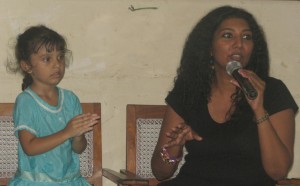 She also observed, to a loud round of applause, that reading down of IPC 377 has brought in a positive change to the lives of sexual minorities. It has encouraged many to come out to their family and friends. In her concluding note, Magdalene talked about the guilt that many people foment in themselves for being different. But the decriminalization of homosexuality had given them confidence and, most of all, hope to live without guilt and fear!
She also observed, to a loud round of applause, that reading down of IPC 377 has brought in a positive change to the lives of sexual minorities. It has encouraged many to come out to their family and friends. In her concluding note, Magdalene talked about the guilt that many people foment in themselves for being different. But the decriminalization of homosexuality had given them confidence and, most of all, hope to live without guilt and fear!
Media Coverage of the event
Taking a stand with pride , Kamini Mathai, Times of India, June 12, 2011
Fight of the Rainbow Coalition , Edwina Shaddick, NXG (Hindu youth section), June 16, 2011

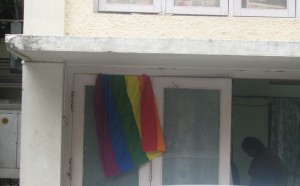
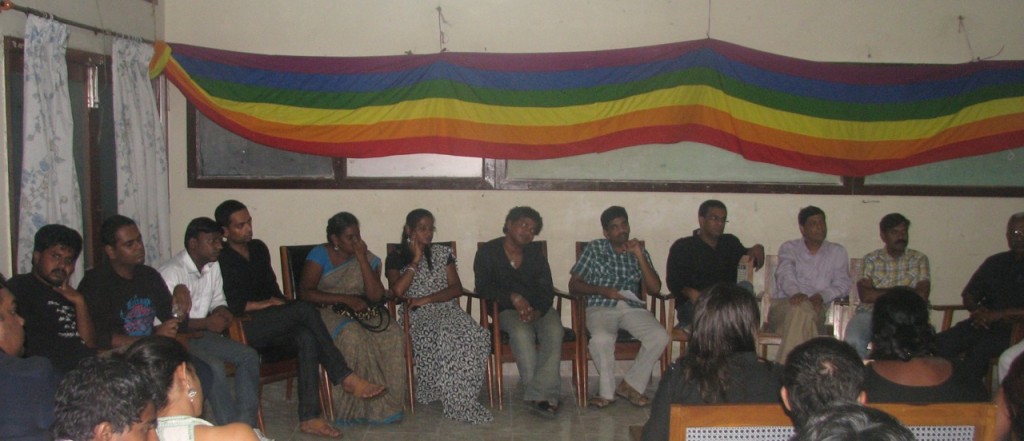
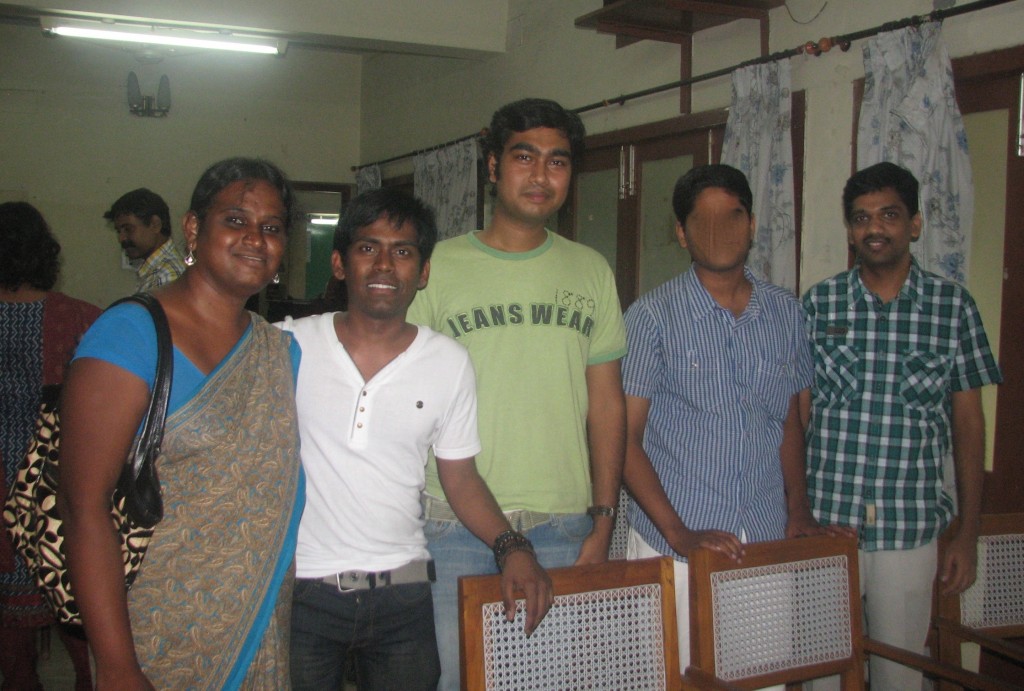
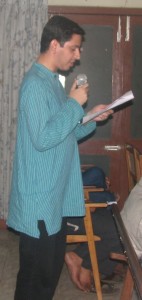
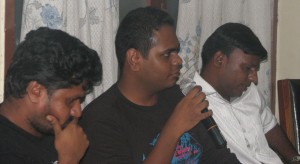
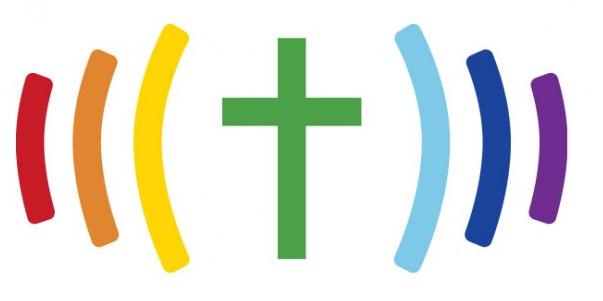
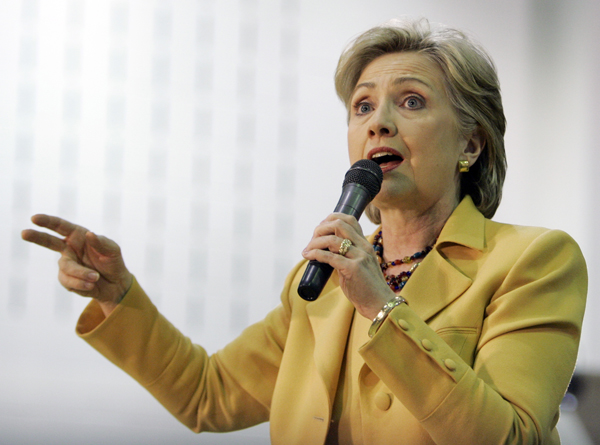
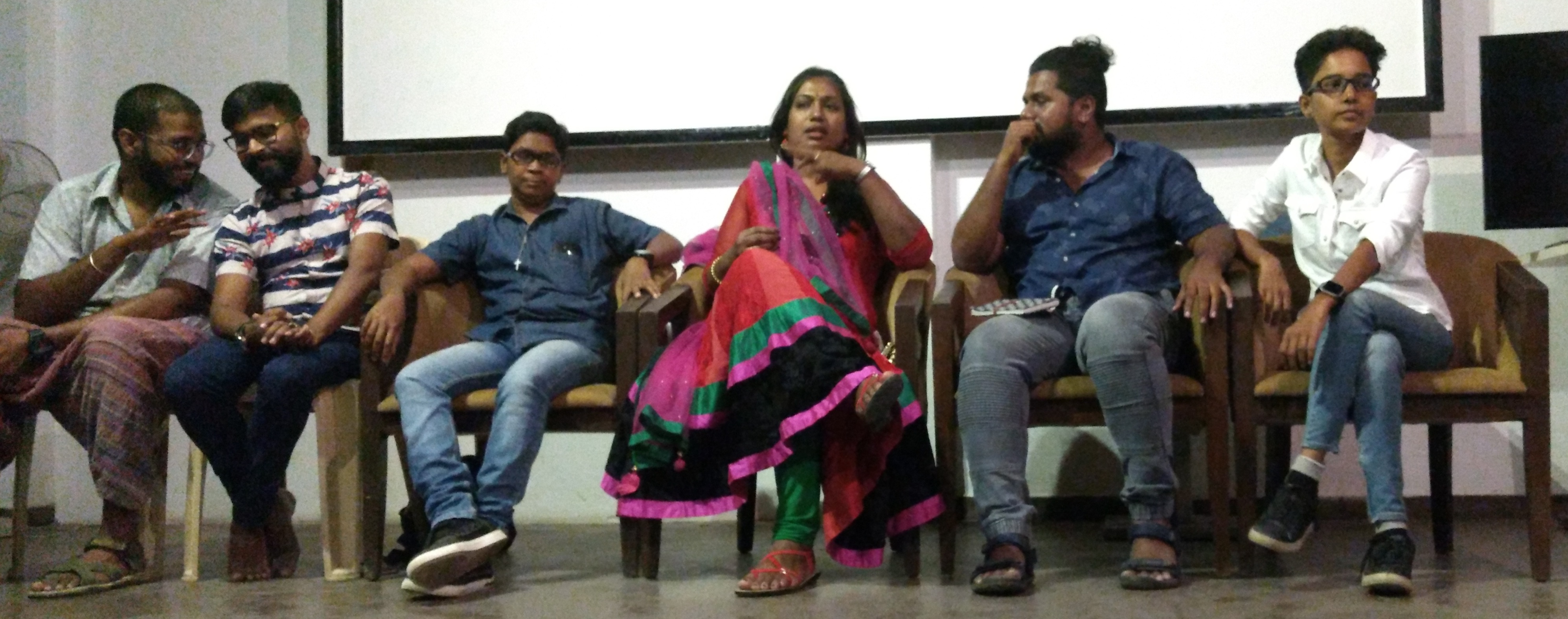
Could I get this article translated into Tamil for my mother to read? I just came out to my parents and it would be of immense help if she could read this article. Thank you.